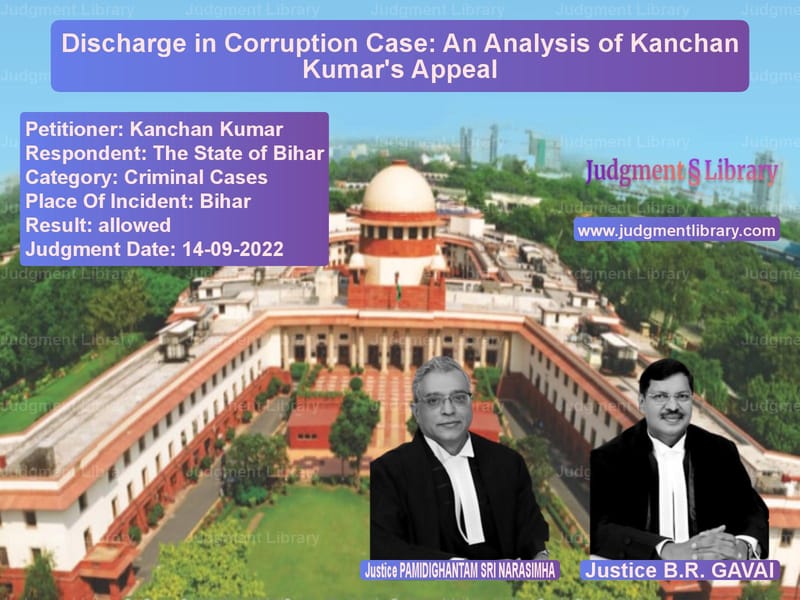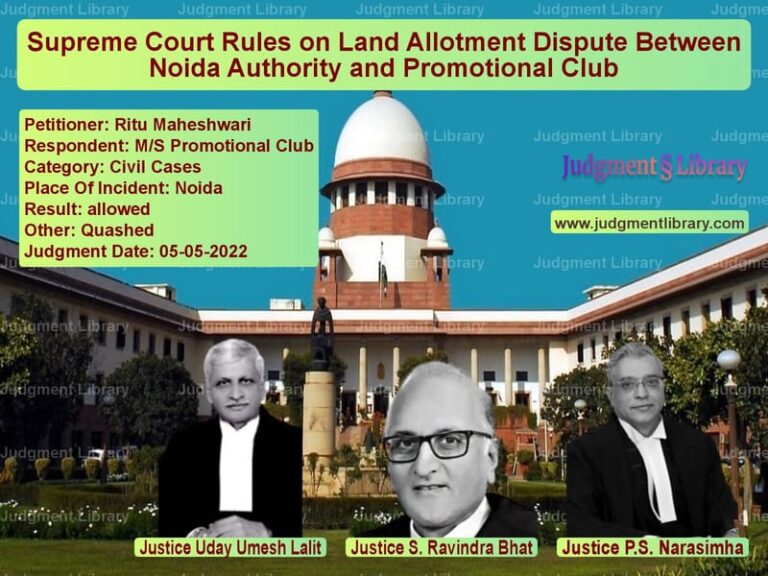Discharge in Corruption Case: An Analysis of Kanchan Kumar’s Appeal
The present criminal appeal arises from the dismissal of Kanchan Kumar’s application for discharge under Section 227 of the Code of Criminal Procedure (Cr.P.C.) by the Trial Court and the High Court. The appeal is centered around allegations of possessing assets disproportionate to known sources of income, filed under the Prevention of Corruption Act, 1988, against the appellant. Kanchan Kumar, who served as an Assistant General Manager with the Bihar State Financial Corporation (BSFC), faced charges related to allegedly acquiring assets during his tenure that did not align with his known income. The appellant’s challenge in this appeal is to the rejection of his discharge application, and the Supreme Court’s intervention was sought in this matter.
The appellant joined BSFC in 1974 and was later accused of purchasing property that was allegedly disproportionate to his sources of income. Despite an initial investigation in 1987 that found the accusations to be false, the matter resurfaced when an FIR was filed against the appellant in 2000, charging him with corruption based on the same allegations. After seven years, the charge sheet was filed in 2007, including accusations that the appellant had amassed disproportionate wealth. The appellant contested the charge, arguing that there were errors in the calculation of his income and expenditure. This appeal is the outcome of his persistent attempts to challenge these charges and secure discharge.
Petitioner’s Argument
Senior Counsel Shri Sunil Kumar, representing the appellant, argued that there were glaring errors in the calculation of the appellant’s alleged assets and expenditure, which were used as the foundation of the charges against him. The core of the defense was that the prosecution’s case was based on an inaccurate and inflated valuation of the appellant’s wealth, which included items that were not related to the period under investigation. Kumar pointed out that discrepancies in the reported balance in the appellant’s bank account and errors in counting loan repayments and asset valuations should have been sufficient grounds for the Trial Court to discharge the appellant from the case.
The counsel emphasized that these mistakes should not have been ignored, especially considering that such discrepancies had a direct impact on the fairness of the proceedings. In support of this, he referred to various judgments, including the cases of Union of India v. Prafulla Kumar Samal and Anr. and Ghulam Hassan Beigh v. Mohammad Maqbool Magrey, where similar issues were raised regarding discharge applications.
Respondent’s Argument
On behalf of the respondent, Shri Abhinav Mukerji AOR argued that the Trial Court was correct in dismissing the discharge application. The defense’s claims regarding the errors in the evidence were not substantial enough to merit a discharge at this stage. He emphasized that under Section 239 of the Cr.P.C., the Courts are not permitted to conduct a roving inquiry into the merits of the case when deciding whether to proceed with the charges. The defense’s request to scrutinize and question the evidence at the discharge stage was inappropriate, as the Court could not weigh the evidence as it would in a full trial.
The respondent’s counsel contended that the High Court and Trial Court had rightly refrained from engaging in a detailed analysis of the evidence at this stage, and the charge against the appellant was prima facie justified based on the available material.
Read also: https://judgmentlibrary.com/juvenility-in-criminal-cases-a-legal-battle-for-justice/
Court’s Analysis and Ruling
The Supreme Court examined the case thoroughly, focusing on the appellant’s objections regarding the errors in the calculation of assets and expenditure. The Court found that the discrepancies pointed out by the appellant were indeed substantial. The inclusion of an inflated bank balance of Rs. 55,000, the improper calculation of loan repayments, and the inclusion of articles found during a 2000 search (well outside the check period of 1974 to 1988) were all critical errors in the prosecution’s case. The Court noted that these issues should have been addressed by the Trial Court when considering the discharge application, as they significantly impacted the fairness of the charge sheet.
The Court further emphasized that the discharge stage does not require the Court to engage in a detailed examination of the entire case but does require the Court to assess whether the prosecution has presented sufficient prima facie material to justify proceeding with the trial. The Court noted that the discrepancies pointed out by the appellant were clear enough to suggest that there was no prima facie case for corruption under the Prevention of Corruption Act, and that the appellant should be discharged from the proceedings.
In its ruling, the Court reiterated the principles established in previous judgments, particularly the requirement that the Court must not act as a mere post office for the prosecution but must independently assess the material presented. The Court also referenced earlier decisions where it was held that, while the Court should not engage in a roving inquiry, it must still sift through the material to determine whether a strong suspicion exists against the accused.
The Supreme Court’s judgment also considered the protracted timeline of the case. The FIR was filed twelve years after the alleged period of the offense, the charge sheet was filed seven years after the FIR, and the discharge application was dismissed several years later. The Court took note of the significant delay in prosecuting the case, which further undermined the fairness of the proceedings against the appellant.
The Supreme Court ultimately allowed the appeal and set aside the judgments of the High Court and the Trial Court, discharging the appellant from the charges. The Court’s decision underscored the importance of timely, accurate, and fair legal proceedings, particularly in cases where an individual’s reputation and livelihood are at stake.
Conclusion
This case highlights several important aspects of criminal law, particularly regarding the discharge process under Section 227 of the Cr.P.C. The ruling emphasizes the Court’s responsibility to carefully scrutinize the evidence presented before it, especially in cases involving serious allegations of corruption. It also highlights the principle that a delay in prosecuting a case and the inclusion of flawed evidence can significantly affect the fairness of the trial. The decision to discharge Kanchan Kumar sets an important precedent for ensuring that criminal cases are handled with due diligence and fairness at every stage of the proceedings.
Petitioner Name: Kanchan Kumar.Respondent Name: The State of Bihar.Judgment By: Justice PAMIDIGHANTAM SRI NARASIMHA, Justice B.R. GAVAI.Place Of Incident: Bihar.Judgment Date: 14-09-2022.
Don’t miss out on the full details! Download the complete judgment in PDF format below and gain valuable insights instantly!
Download Judgment: kanchan-kumar-vs-the-state-of-bihar-supreme-court-of-india-judgment-dated-14-09-2022.pdf
Directly Download Judgment: Directly download this Judgment
See all petitions in Fraud and Forgery
See all petitions in Money Laundering Cases
See all petitions in Bail and Anticipatory Bail
See all petitions in Judgment by P.S. Narasimha
See all petitions in Judgment by B R Gavai
See all petitions in allowed
See all petitions in supreme court of India judgments September 2022
See all petitions in 2022 judgments
See all posts in Criminal Cases Category
See all allowed petitions in Criminal Cases Category
See all Dismissed petitions in Criminal Cases Category
See all partially allowed petitions in Criminal Cases Category







